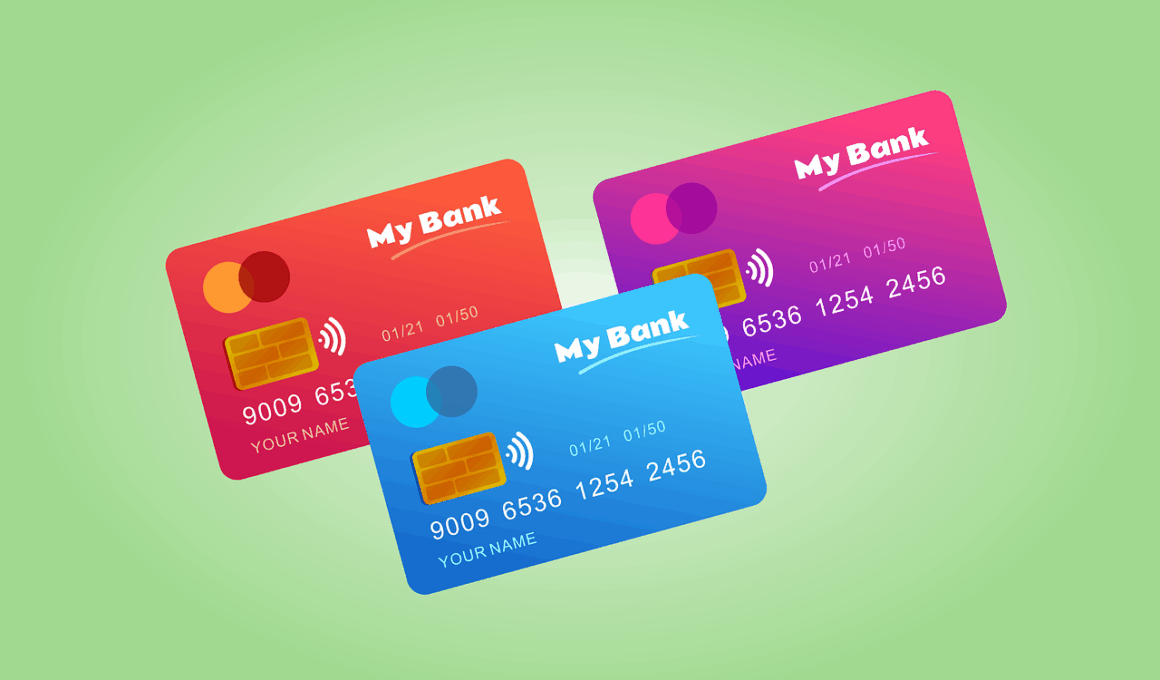Smart Ways to Use Credit Cards as a Couple
Using credit cards wisely as a couple can strengthen your financial health and improve your budgeting skills. Begin by discussing your individual spending habits and financial goals. This step is essential for creating a unified strategy that caters to both partners’ needs. Assign roles, such as who handles monthly payments and monitoring expenses. Both partners should have access to the account to ensure transparency. Set monthly spending limits to avoid overspending and establish accountability. Additionally, explore co-branded credit cards that offer benefits aligned with your joint lifestyle. For instance, if you frequently travel together, a travel rewards card might be beneficial. Always compare cards based on interest rates, annual fees, and rewards programs. Moreover, pay attention to the due date to maintain a good credit score. Regularly review your credit card statements together to track spending trends and adjust your budget accordingly. Finally, consider using credit cards for planned purchases to accumulate points while remaining within your budget. This method not only helps build your credit but also offers rewards that can enhance your future experiences. Pair these strategies with open communication for optimal results.
One significant advantage of using credit cards as a couple is the opportunity to build credit together. Good credit scores are vital for significant financial decisions, such as buying a home. By sharing credit responsibilities, you can create a solid credit history. Prioritize making timely payments and maintaining a low credit utilization ratio to boost your scores. Credit cards often offer rewards that can benefit both partners. Accumulate points for purchases that align with your shared interests, such as dining or traveling. Discuss how to use these rewards effectively to maximize benefits. Leverage your credit card company’s tools and resources to create alerts for payment due dates and potential overspending. These tools can help cultivate better financial habits. Consider setting aside some rewards for emergencies or larger purchases you both agree upon. Review your shared credit card statement regularly to avoid misunderstandings and ensure both partners stay informed. This practice fosters trust and accountability while serving as a foundation for a more transparent financial partnership. Lastly, consider scheduling regular financial check-ins to stay aligned on your goals and make necessary adjustments to your strategies as needed.
Utilizing Rewards for Joint Goals
Deciding how to use rewards for your shared goals is crucial when managing credit cards together. Determine what collective goals are most important to you both. If traveling is a significant priority, consider focusing on accumulating points or miles on a travel rewards credit card. This approach can help finance vacations or weekend getaways. Alternatively, if home improvements are on your agenda, explore credit cards offering cashback on home goods and services. Establishing common goals will encourage collaboration and make the reward process more enjoyable. Set a target number of points for specific purposes, such as a romantic dinner or a weekend getaway. Regularly discuss your rewards progress to stay motivated and make adjustments if necessary. Furthermore, combining efforts can lead to more significant rewards accumulated faster than if each partner were to go solo on their spending. Every few months, evaluate how you’re progressing towards these goals, and celebrate successes along the way. This reinforces the bond you share, showcasing teamwork while reaching financial milestones together in a more efficient manner.
Credit cards can sometimes lead to overspending if not managed properly. To combat this, create a joint budget that incorporates your credit card spending. Both partners should agree on what percentage of your income will be allocated towards credit card payments. Set up auto-pay on your credit card accounts to prevent late payments while sticking to your budget. This ensures timely payments and helps avoid damaging your credit scores. Additionally, identify financial triggers that lead to impulsive spending and discuss them together. For instance, if emotional spending is a challenge, establish strategies to manage this behavior. Designate certain credit cards solely for emergencies to instill discipline. Consider limiting the number of credit cards you hold instead of accumulating several, which can lead to confusion. Utilize budgeting tools or apps to track expenses together, ensuring that both partners can monitor spending in real-time. Maintain consistency in discussions regarding your financial situation, as it enhances transparency. Encourage each other to stick to the agreed-upon budget and celebrate when you meet spending goals, promoting a positive financial dynamic.
Educating Each Other About Finances
Another crucial aspect is educating each other regarding credit card management and finances. Share insights from your respective financial backgrounds, including experiences with budgeting, saving, and debt. By doing so, you both can develop a deeper understanding of each other’s financial philosophies. Attend financial workshops together or read books about financial literacy to enhance your knowledge as a team. Create opportunities to discuss the pros and cons of various credit cards and their terms, helping both partners feel more informed. Make it a habit to review the credit card terms and changes regularly to stay informed about benefits and limitations. This process allows for more deliberate decision-making when choosing or using credit cards. Additionally, diversify individual financial knowledge by learning about investing, retirement savings, and risk management, as these elements influence your financial life together. Engage in regular discussions about financial goals, progress, and challenges faced. This open dialogue fosters trust and strengthens your financial partnership, as you both feel empowered to support each other.
Using credit cards responsibly requires discipline, particularly within a relationship. To cultivate this discipline, establish ground rules for your credit card usage. Prioritize payment criteria, and discuss how to handle unexpected expenses. Agree on a communication plan before any significant purchases are made, which supports engagement and understanding. Both partners should feel comfortable voicing concerns or sharing feedback without fear of conflict. Encourage mindful spending habits by reviewing budgets regularly and acknowledging both successes and areas for improvement. Additionally, prioritize finding ways to increase your collective income over resorting to credit card debt. Explore side hustles or investments to enhance financial security. Consider postponing purchases that aren’t essential until your financial stability improves. Also, remember to monitor credit card balances consistently and never exceed predetermined spending limits. This discipline helps maintain a healthy credit score and prevents accruing unmanageable debt. Finally, conclude each month with a short meeting to assess your progress. Recognizing accomplishments, no matter how small, reinforces commitment to your shared financial goals and supports a holistic approach to managing debt healthily.
Taking Action to Ensure Mutual Growth
As you continue using credit cards as a couple, maintaining mutual growth becomes paramount. Set long-term financial goals together, such as buying a house or saving for retirement. Discuss how credit card usage can effectively contribute to these milestones. Build a shared vision for your financial future, while making commitments to monitor progress regularly. Keep discussing how credit impact your overall financial stability and keeping each partner accountable. Determine which financial targets should take precedence, adjusting spending and saving behaviors as necessary. For instance, if debt payoff becomes a priority, strategize jointly about reducing discretionary spending on your cards. Explore balance transfer options to lower interest payments on existing debts, making an informed joint decision. Furthermore, continually evaluate your financial landscape since priorities may change over time. This promotes flexibility, ensuring your credit strategies remain relevant. Celebrate meeting milestones, acknowledging the hard work put in. Recognizing achievements strengthens your bond and encourages continued commitment to shared financial responsibility. Remember that open, honest communication and teamwork are critical to achieving success while using credit cards as a couple.
Implementing effective communication techniques about credit card usage is indispensable. Consider using joint calendars for tracking spending, payment schedules, and reminders to keep both partners in the loop. This way, you can maintain consistency and support financial goals together. Additionally, schedule monthly reviews to assess how well you’re adhering to your budget and financial commitments. Share any challenges you encounter, allowing for constructive discussions that lead to solutions. If one partner feels overwhelmed, discuss alternative credit plans or seek professional advice. Always remember that finances can be a sensitive topic; practice empathy and understanding while discussing money matters. Addressing issues without blame or judgment helps foster trust and cooperation. As the relationship evolves, so might your financial goals. Stay open to revisiting discussions about how you utilize credit cards to meet changing needs. Flexibility helps you both adapt together, ensuring you remain aligned in your decisions. Ultimately, the more efforts you both invest in nurturing your financial relationship, the better equipped you’ll be to handle challenges and strive for mutual success. Building a strong financial foundation as a couple relies on constant learning, open dialogue, and shared responsibility.





